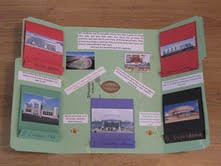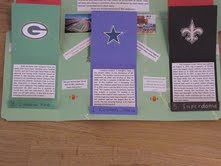Mini Reports: Put the Fun in Non-Fiction!
By Brave Writer Instructor, Christine Gable
It was one of those evenings when all I needed was a hot soak in the tub—with lots of bubbles. That was where I was headed when my daughter asked if she could type on my laptop. Sure thing! I can’t imagine ever saying no when a child is volunteering to put words on paper (well, cyber-paper).
As I soaked my tired bones, I could hear my daughter busily typing away at my desk. Every once in a while I would hear a chuckle. (Hmmm, could she actually be having a good time?) Half an hour later, relaxed and pleasantly warm in my fluffy robe, I shuffled past her on my way to the bed, to read.
“Don’t look, Mom! I’ll show it to you when I’m done—I have to finish the last section.”
It was getting late by that time so the final installment was put on hold until the next day. Fast forward two evenings and I had the privilege of holding in my hands the very first issue of “Loose Ends,” her mini mag.
There were bullet points, an advice column, and a listing of 10 ways to use a bandanna. With a table of contents and catchy subtitles, this was quite an entertaining read.
Hold on here. Was I actually holding a piece of writing that had been voluntarily produced? Without warnings and threats? Something that didn’t have to be done for school … or for a grade?
Be still my heart.
My daughter had tucked in some health tips and historical tidbits she had learned from the past week in school. She had “created an expert” and quoted an attention-grabbing article. She had chosen fonts and colors that gave it the finishing touch. And best of all: her voice and personality shone through in the subject and word choices.
This was a mini report! She had created an original piece of writing that was witty, had insight—and (mostly) correct punctuation!
She had tapped into her current academic base of knowledge and had put her own unique voice and twist on it. She had chosen a format that allowed for creativity—and most importantly, one that “spoke” to her. It was a choice that she made as an author.
This is one of the most exciting events that we can witness as our kids are maturing and their writing abilities expand. While it can seem as though writing projects fall to the bottom of the to-do list because they can be fraught with angst and indecision, I’ve found that using mini-report formats can be very beneficial. Your children can use everyday real-life experiences and their current knowledge-base in concrete writing forms that help them distill those ideas into words.
Just the word “mini” in and of itself is sublime. We think “mini skirts” and “mini Coopers” and “Minnie Mouse.” The word “mini” feels easy and naturally small. Link “mini” to “report” and it becomes manageable, chic, and not too big—for not only does this non-fiction 750-word format take the Brave Writer philosophy of writing into the world of formats, it helps retain the playfulness that is at the heart of all good writing.
Write a mini-report? Hey, I can do that!
Each of the formats that we use in the Mini Reports Brave Writer Online Class offers kids a way to tap into their experiences and knowledge. It offers them a chance to use academic sources, to interview real people, to take notes while watching a DVD or TV show. Mini reports offer kids a means of growth from freewriter to academic writer—the perfect transition tool.
There’s just one thing I have yet to figure out: could taking bubble baths while handing the laptop to our kids be an important part of nurturing the mini report writing process? (I’m betting that Julie would approve.)
Now that’s one writing tip that I know we moms wouldn’t mind implementing at all!
Sign ups for the Winter Class Slate start on Monday December 5, 2011.
PS — I’ve included pictures of several mini reports from recent classes. It’s such a joy to work with students and parents on these projects! (Check out the Winter Quarter Mini Reports Online Classes here.)




















Hey, Julie. Isn’t it great to see our kids enjoying writing and seeing their finished products? I love lap books and mini reports since it’s not so overwhelming for students to research a topic. I have always appreciated how you can help students take a task that seems so big and overwhelming and break it down into smaller, manageable pieces. Thanks!
[…] Also, I just read a terrific article from a friend of mine about making non-fiction reports fun. Check out her blog by clicking here. […]
Christine,
My apologies for not addressing my comments to you! I just realized that you had written this article, and not Julie. I love the idea of a mini mag. I can see this being easily incorporated into various subject areas. I see you are teaching a class on this soon and it looks like fun.